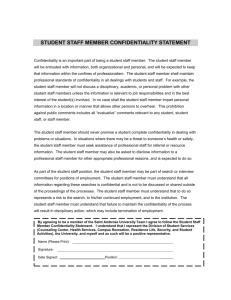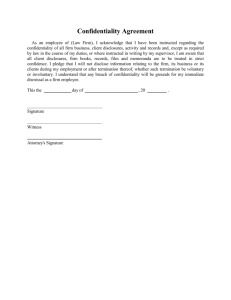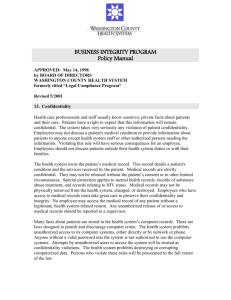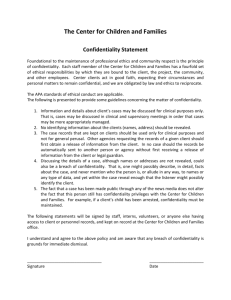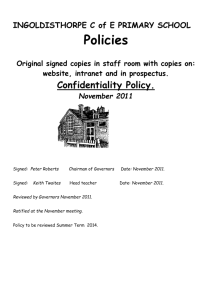Some professional codes of confidentiality
advertisement
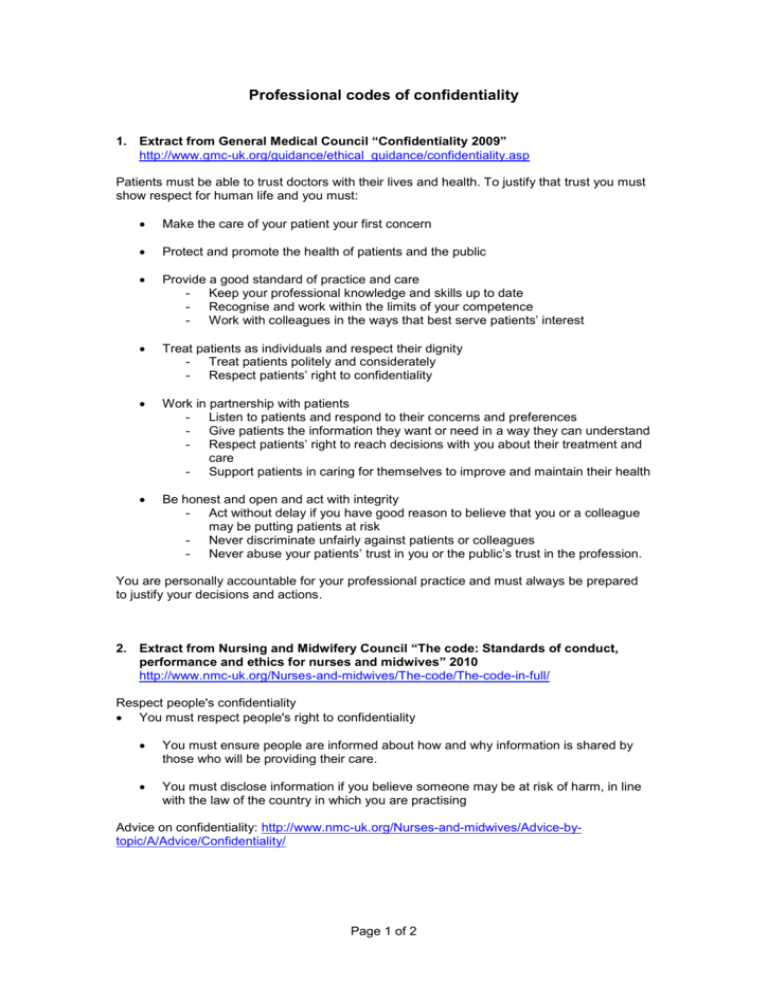
Professional codes of confidentiality 1. Extract from General Medical Council “Confidentiality 2009” http://www.gmc-uk.org/guidance/ethical_guidance/confidentiality.asp Patients must be able to trust doctors with their lives and health. To justify that trust you must show respect for human life and you must: Make the care of your patient your first concern Protect and promote the health of patients and the public Provide a good standard of practice and care - Keep your professional knowledge and skills up to date - Recognise and work within the limits of your competence - Work with colleagues in the ways that best serve patients’ interest Treat patients as individuals and respect their dignity - Treat patients politely and considerately - Respect patients’ right to confidentiality Work in partnership with patients - Listen to patients and respond to their concerns and preferences - Give patients the information they want or need in a way they can understand - Respect patients’ right to reach decisions with you about their treatment and care - Support patients in caring for themselves to improve and maintain their health Be honest and open and act with integrity - Act without delay if you have good reason to believe that you or a colleague may be putting patients at risk - Never discriminate unfairly against patients or colleagues - Never abuse your patients’ trust in you or the public’s trust in the profession. You are personally accountable for your professional practice and must always be prepared to justify your decisions and actions. 2. Extract from Nursing and Midwifery Council “The code: Standards of conduct, performance and ethics for nurses and midwives” 2010 http://www.nmc-uk.org/Nurses-and-midwives/The-code/The-code-in-full/ Respect people's confidentiality You must respect people's right to confidentiality You must ensure people are informed about how and why information is shared by those who will be providing their care. You must disclose information if you believe someone may be at risk of harm, in line with the law of the country in which you are practising Advice on confidentiality: http://www.nmc-uk.org/Nurses-and-midwives/Advice-bytopic/A/Advice/Confidentiality/ Page 1 of 2 3. Extract from General Social Care Council “The codes of practice for social workers and employers” 2002 http://www.gscc.org.uk/codes/ As a social care worker you must strive to establish and maintain the trust and confidence of service users and carers This includes: 2.1 Being honest and trustworthy; 2.2 Communicating in an appropriate, open, accurate and straightforward way; 2.3 Respecting confidential information and clearly explaining agency policies about confidentiality to service users and carers; 2.4 Being reliable and dependable; 2.5 Honouring work commitments, agreements and arrangements and, when it is not possible to do so, explaining why to service users and carers; 2.6 Declaring issues that might create conflicts of interest and making sure that they do not influence your judgement or practice; and 2.7 Adhering to policies and procedures about accepting gifts and money from service users and carers. 4. Extract from UK Council for Health Informatics Professionals “Code of Conduct: Protecting and acting in the interests of patients and the public” http://www.ukchip.org/?q=page/UKCHIP-Code-Conduct All health informatics professionals shall, to the best of their ability, protect and promote the interests of patients and the public by: Ensuring that information systems and equipment for which they are responsible are procured, installed, maintained and operated professionally, efficiently and safely, and provide good value for the public money invested in them; Ensuring the security, confidentiality, accuracy and integrity of information, and protecting the safety of patients and the public, both directly through their personal actions and indirectly through the design and operation of any information systems for which they are responsible; Reporting to the proper authorities any improper or misleading use of information, whether accidental or deliberate, or misconduct by any person in connection with the procurement, operation or use of information systems and equipment; Promoting the appropriate use of information to enhance patient and public involvement and to support patient empowerment, dignity and choice. Page 2 of 2



